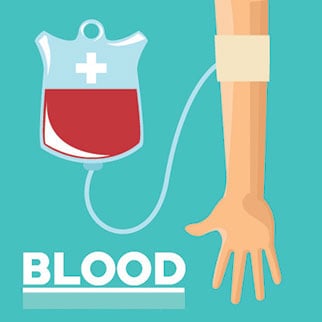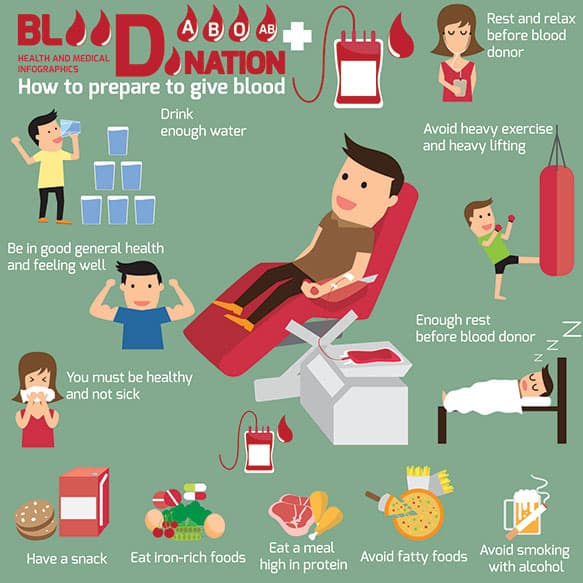If you have been diagnosed with diabetes, you may have questions about donating blood.
Blood banks are always in need of donations. During disasters and other emergencies, people often require blood transfusions to survive.
It’s only natural that people with diabetes will want to help in situations when blood transfusions are needed, and people with both Type 1 and Type 2 Diabetes can and do donate blood in the United States.
It’s important to note that just one pint of blood can help up to three people in need.
However, there are some things that you need to know before you donate blood and have diabetes.
In this article, we will look at the requirements for donating blood with diabetes, as well as general requirements for donating blood in the United Kingdom, Canada, and Australia.
Contents
- Sylvia’s story
- What do I need to know before I donate blood with diabetes?
- Your diabetes should be under controlled before you donate blood
- You should be in good overall health before you donate blood with diabetes
- During your blood donation
- Aftercare
- Countries
- What if you get turned down for some reason to donate blood with diabetes?
- Over to you
Sylvia’s story
Sylvia came in for diabetes education. She wanted to donate blood since everyone at work was getting involved in the blood drive. Her employer was offering a half day off work for employees giving blood. You can’t blame Sylvia for not wanting to miss out on free time off, and help others in the process.
Several months ago, Sylvia had just been diagnosed with diabetes, and her blood sugars and A1C were not in target. Sylvia still felt fatigued often, and she wasn’t sure if donating blood was a good idea since she didn’t have her diabetes management where it needed to be.
The afternoon Sylvia was scheduled to come in to donate blood, her two-hour post-meal blood sugar was 237 mg/dL and her A1C was still over 10% at her last doctor visit a month ago. Should Sylvia have donated blood at the blood drive that afternoon?
Let’s explore this, and other questions that you may have about donating blood with diabetes.
What do I need to know before I donate blood with diabetes?
It’s good to know the Red Cross guidelines when you plan to donate blood with diabetes. The Red Cross will take blood donated from people with diabetes in the United States if the person has their diabetes under control. It doesn’t matter if you are on insulin, have Type 1 or Type 2 Diabetes, as long as you are well managed, and are in generally good health.
Donation process
The donation process is fairly easy, and you should be in and out within the hour.
Screening for blood donation with diabetes
The general age to donate blood is 16. Age does vary by state, so check with your local Red Cross blood banks for the age cut-off to donate blood in your state.
Will your blood sugar or your A1C be tested before you give blood? No, they will not go to such extremes, therefore, it is your responsibility to be honest with the Red Cross when attempting to donate blood with diabetes.
At the blood bank, a Red Cross representative will check your vital signs, including your temperature, heart rate, and blood pressure, and weight. They will check your blood to determine your Hemoglobin. This lets the Red Cross know if you are anemic, which means that you have a lower number of red blood cells than is considered normal. If you are anemic, you won’t be able to give blood until your red blood cells return to the normal number. You will have to treat your anemia before you consider donating blood.
Additionally, you must weigh at least 120 pounds, and be at least 5 feet, 4 inches tall to give blood in the United States.
I recommend reading the following articles as well:
Your diabetes should be under controlled before you donate blood
To donate blood with diabetes, your blood sugar needs to be in your target range. Your A1C should be less than 7%, as recommended by the American Diabetes Association. If your blood sugars and diabetes are not well controlled, you shouldn’t donate blood.
It’s up to you to let the Red Cross know. If you are unsure about the condition of your diabetes, discuss your concerns with your healthcare provider. They will be able to help you decide if giving blood is a good idea, or if you should wait until your diabetes is better managed.
You should be in good overall health before you donate blood with diabetes
Besides having your blood sugars in control, you should also have other conditions under control. For example, your blood pressure should be less than 180/100 mmHg to give blood, which is higher than 140/90 mmHg that is the recommended blood pressure for people with diabetes. Conversely, if your blood pressure is less than 90/50 mmHg, you won’t be able to donate blood.
Besides diabetes, they will also ask you about other conditions, and medications which you may be taking. Diabetes medications generally won’t keep you from giving blood in the US, but there is a Red Cross list of other medications that shouldn’t be taken if you are donating blood, including blood thinners. The Red Cross representative will screen you for conditions and medications which may affect your ability to donate blood with diabetes and related health conditions.
Another thing to know is that if you plan to donate platelets, you should not take aspirin or blood thinners for several days prior to your donation. 1
Heart disease and donating blood
If you have heart complications from your diabetes, there are some things that you need to know. Heart disease will generally not stop you from donating blood if you have diabetes, but if it has been less than six months since you have had symptoms related to your heart disease, then you may not be able to donate.
If your heart disease is stable and being treated, and you have had no issues in the last six months, such as chest pains or shortness of breath, you should then be okay to donate blood. You should also have no restrictions of activities due to your heart if you plan to donate blood.
You will have to wait six months following episodes of chest pains and shortness of breath, as well as following heart surgeries or procedures, such as heart catheterizations. If your heart medications have been changed, you must wait six months until you are stable on them.
For those with a pacemaker, six months following your procedure, you should be safe to donate blood as long as your heart rate is between 50 and 100, and other criteria for giving blood with heart conditions are met. It’s a good idea to sit down with your healthcare provider, and have a talk to determine if it is safe to donate blood.
Other factors that affect whether you can donate blood
If you travel internationally, there may be some instances where you can’t donate blood. The Red Cross will screen you for travel to specific affected countries where donating blood may pose a risk to the recipient of the blood.
How long does it take to donate blood?
It generally takes about an hour to donate a pint of blood at a blood bank. It’s just a small amount of time that you must give from your day to help up to three people with your blood donation.
The actual blood donation part only takes about ten minutes. A large gauge needle will be inserted into your vein. It generally hurts when going in, but subsides after the initial pinch. You will be able to rest comfortably in a chair while you donate.
How can I prepare for donating blood?
It’s important to be prepared for when you donate blood with diabetes. Below are a few tips to make sure you are ready to give blood.
If you aren’t feeling well the day of blood donation, reschedule your donation
It’s important to be feeling your best prior to giving blood. If you are feeling under the weather, it’s best to postpone blood donation until you are at your optimal level of health. Donating blood is tiresome, and many people feel weak and fatigued following blood donation.
Eat regular meals for several days before giving blood with diabetes
Besides keeping your blood sugars and A1C in target with appropriate lifestyle changes, you should also make sure that you eat regular meals for several days before giving blood. If you have diabetes, you should be eating regular meals anyway, so it shouldn’t be much of a stretch to accomplish.
Hydrate with non-carbohydrate fluids prior to donating blood with diabetes
Drinking extra non-carbohydrate fluids, mainly water, will also help you to hydrate prior to donating blood with diabetes. It’s a good idea to hydrate, and eat adequate meals for several days prior to your blood being donated to the Red Cross. You want to make sure that you have adequate nutrition and hydration before giving blood.
Eat iron-rich foods for several days prior to donating blood with diabetes
Iron-rich foods help to raise blood hemoglobin. Therefore, eating spinach, kale, or other greens, and fish, chicken, red meat that is lean, as well as beans, raisins, and cereals and other foods that have iron added to them, can help your blood hemoglobin test higher when you are giving blood with diabetes.
You may also want to take a vitamin with iron, or talk to your healthcare provider about a prescription iron tablet if needed.
You should take iron supplements for at least two weeks prior to donating blood with diabetes.
Avoid caffeine on the day of blood donation, and drink water before donating blood
You should limit caffeine on the day of the donation. In addition, avoid alcohol, and drink at least 16 ounces of water to keep hydrated.
Avoid high fat containing foods on blood donation day
You should always avoid foods with a high fat content when you have diabetes, but it’s particularly important to do so on blood donation day, because high fat foods may affect the blood tests that the Red Cross does to determine your eligibility to give blood.
If there is an excessive amount of fat in your blood, the Red Cross will be unable to test your blood for infectious processes that could affect the recipient. Therefore, your blood will not be able to be used for transfusions. You would be donating blood for nothing. Make sure not to eat high fat foods, such as ice cream, fried foods, and high fat meats prior to giving blood.
Try to get a full eight hours of sleep prior to donating blood
Getting adequate sleep can help you avoid post-blood donor fatigue. Plan on getting a full eight hours of sleep prior to giving blood.
Bring a list of all the medications that you are taking to the blood bank
Make sure that you bring with a full list of all medications, and supplements. The list should include all your diabetes medications, and any medications that you take for other conditions, such as high blood pressure, or heart disease.
If you have ever received bovine(beef) insulin anywhere, you can’t give blood due to possibility of “Mad Cow” disease. This isn’t likely to be the case in the US, but if someone with diabetes in the US has lived in the United Kingdom, it’s possible they could have received insulin made from cows at some point.
You will need your identification before donating blood
When you go to the blood bank, make sure to carry your driver’s license, other picture identification, or two other forms of identification with you.
During your blood donation
When you go to the blood bank, dress appropriately. Make sure that your shirt has sleeves that are loose enough to be pushed above your elbow. If possible, help out the Red Cross volunteer and show them your best veins. Most people with diabetes know where their best veins are located.
Take something to read, or a music player with head phones so that you can relax during the donation process. It’s helpful to look away, and to think about something else, like a nice day at the beach, rather than watching the nurse insert the needle. A little distraction goes a long way to trick your brain into barely feeling the needle going in.
After you donate, get a drink and a snack so that you don’t get lightheaded. Giving blood can take a lot from you! It’s a great thing to do, but some people will feel faint, and may even pass out.
I know this to be true, as in high school when I gave blood, I fainted and was weak the rest of the day in the nurse’s office. As an adult, weighing a bit more, and knowing how to prepare, I can give blood with no problems.
Aftercare
Intake of iron
It’s a good idea to eat iron-rich foods for up to six months following your blood draw. It takes that long for your red blood cells to duplicate, and make a pint of whole blood.
Get your rest after giving blood
Make sure that you get some rest, and a good night’s sleep. When you donate blood, it takes some of your blood volume, and it takes awhile for your body to make more red blood cells, and increase your hemoglobin again. Getting rest can help your body to rejuvenate those blood cells that you donated.
What can I expect after donating blood with diabetes?
For the next 24 hours after donating blood with diabetes, make sure that you drink plenty of fluids. Stay away from alcohol, as it may only increase your dizziness or weakness if you have any, or cause it if you don’t.
You will have a bandage where the needle went into your arm. Leave it on for at least several hours after you give blood. Make sure not to plan any vigorous activity or exercise for the rest of the day, and don’t lift anything weighing more than 15 pounds.
If the site where the needle was inserted starts to bleed through the bandage, make sure that you apply pressure, and hold your arm up above your heart for at least 10 minutes.
You can call the Red Cross at 1-866-236-3276 to report any information that you may have forgotten to disclose during your visit. You can also report any issues you may have encountered while donating blood, or issues after giving blood that required medical care. Visit the Red Cross at www.redcrossblood.org/iron, to learn more about why you need more iron after you donate blood. 2
Always monitor your blood sugar before and after giving blood
It’s important to check your blood sugars often before and after giving blood. You will want to make sure that you are not having a low or high blood sugar.
Is it safe to donate blood as a person with diabetes?
Yes, it’s generally safe for people with diabetes to give blood if their diabetes is well managed, and have no other health issues, such as heart disease, high blood pressure.
Under what circumstances will I not be able to donate blood
If your diabetes is not well managed, and you have other health problems, you shouldn’t donate blood.
Countries
Can you donate blood if you have diabetes in the United States?
If you live in the United States, and you have Type 1 or Type 2 Diabetes, you can donate blood. This article primarily refers to blood donation for people with diabetes in the United States, but we will look at a few other countries, and their rules for blood donation. The United Kingdom has some different restrictions for blood donations which we will briefly touch upon.
The following is the statement from the American Red Cross related to donating blood with chronic health conditions, such as diabetes:
“To give blood for transfusion to another person, you must be healthy, be at least 17 years old or 16 years old if allowed by state law. You must weigh at least 110 pounds, and not have donated whole blood in the last 8 weeks (56 days) or double red cells in the last 16 weeks (112 days). "Healthy" means that you feel well and can perform normal activities. If you have a chronic condition such as diabetes or high blood pressure, "healthy" also means that you are being treated and the condition is under control.
Most chronic illnesses are acceptable as long as you feel well, the condition is under good control, you have an adequate hemoglobin level and your temperature is normal when you come to donate, and you meet all other eligibility requirements.
Donors with diabetes who since 1980, ever used bovine (beef) insulin made from cattle from the United Kingdom are not eligible to donate. This requirement is related to concerns about variant CJD, or 'mad cow' disease.”
Can you donate blood if you have diabetes in the United Kingdom?
If you have Type 2 Diabetes which is controlled by diet and oral diabetes medications, you shouldn’t have any trouble giving blood in the United Kingdom.
If you have Type 1 Diabetes, and you wish to donate blood in the United Kingdom, the blood bank representative will ask you questions about how long you have been taking insulin, and what kinds of insulin you have been taking throughout your time with your Type 1 Diabetes. Similarly, if you take insulin for your Type 2 Diabetes, you will also be asked these questions.
The reason is that many people in the United Kingdom have received beef or “bovine” insulin since the early 1980s. This will disqualify you from donating blood, due to the chances that the beef insulin might have carried “Mad Cow Disease.”
Similarly, with CJD (Creutzfeldt-Jakob Disease, or Mad Cow disease), if you have received growth hormones, or a brain transplant, you won’t be eligible to donate blood in the United Kingdom.
This does mean that many people with Type 1 and Type 2 Diabetes in the United Kingdom are not eligible to donate blood. In many cases, people in the United Kingdom have not been allowed to donate blood if they take insulin of any type.
This seems to be due to misinformation among blood donor bank representatives, who don’t understand the different kinds of insulins very well. Due to this, people taking Humulin or Novolin human insulins have also been turned away from donating blood in the United Kingdom.
In addition, the UK recognizes that the affect of donating blood on insulin levels presents a risk for the person with insulin-dependent diabetes who wants to donate blood. This is another reason why people on insulin are not able to give blood in the UK. The regulations apply to both insulin injections, and insulin delivered by pump, but doesn’t specify if inhaled insulin will be a problem, such as Afrezza.
If you don’t take insulin, you will be able to donate blood with diabetes as long as you haven’t had a change in your medications in the previous four weeks. This could be a change in the dose of your medication, as well as the addition of a new medication for your diabetes.
The new medications and changed dosages can affect your blood sugar, which can put you at risk of blood sugar problems if you donate blood.
In addition, if you have heart disease, you will not be able to donate blood in most cases. Some things that may keep you from donating are faintness, heart failure, or surgeries for arteries that are narrowed or blocked off. This also includes the amputation of limbs.
Other conditions related to the complications of diabetes that will keep you from donating are foot ulcers from nerve damage or neuropathies related to diabetes, tooth infections or dental problems requiring tooth extractions, or transplants of pancreatic tissues. 3
Can you donate blood in Canada if you have diabetes?
In Canada, like the United Kingdom, you can’t donate blood unless you are a non-insulin dependent diabetic. You will likely not be able to donate blood if you take insulin.
Can you donate blood in Australia if you have diabetes?
Yes, you can donate blood in Australia if you have diabetes, regardless of the fact that you take insulin or not. You will need to show that your diabetes is managed well. However, please note that there are still other health conditions that could preclude you from donating blood with diabetes, such as complications of diabetes.
Further reading:
What if you get turned down for some reason to donate blood with diabetes?
If you are unable to give blood when you have diabetes, whether due to unmanaged blood sugars, or complications of diabetes, you can still help by donating money to the Red Cross. Your donation will help the Red Cross with providing supplies for blood donation banks, providing support to families in crisis who are in need, and helping to educate people on lifesaving techniques. There are many things that the Red Cross does to help others. Your donation will help them fulfill their mission. 4
Over to you
You have diabetes and have recently donated blood or are thinking of donating blood?
Please share your comments with our readers to help them make an educated and well-informed decision if they choose to donate blood as well. We hope this article has been helpful.
TheDiabetesCouncil Article | Reviewed by Dr. Christine Traxler MD on May 29, 2020
References:
- https://www.healthline.com/health/diabetes/can-diabetics-donate-blood#overview1
- https://www.everydayhealth.com/diabetes/type2/managing/specialist/getaneh/can-i-give-blood.aspx
- http://www.diabetes.co.uk/can-people-with-diabetes-give-blood.html
- http://www.redcrossblood.org/donating-blood/eligibility-requirements/eligibility-criteria-topic














